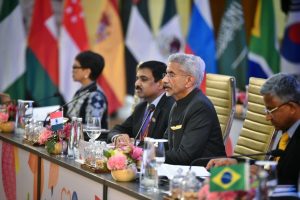At a combustible G-20 foreign ministers’ meeting in New Delhi this week, Russian Foreign Minister Sergei Lavrov asked for the Ukraine war to be kept aside.
All through the West’s wars of old in Iraq, Afghanistan, and the Balkans, the G-20 kept an arm’s length from geopolitics, Lavrov argued. “Hundreds of thousands of Africans died but the G-20 was silent,” he said.
Lavrov even made a dramatic apology for the fracas over Ukraine, which prevented the meeting from issuing a joint statement. “I want to apologize to the Indian presidency and to our colleagues from countries of the Global South,” he said, “for the obscene behavior of some Western delegations, which have turned the G-20’s agenda into a farce.”
To folks sitting in Brussels and Washington, these statements might sound comically theatrical and par for the course. But it’s a narrative that plays well in the G-20’s host nation this year – India – and other non-aligned developing economies with ties to Moscow.
Last year, Indian External Affairs Minister S. Jaishankar lashed out at the West for allowing rhetoric over Ukraine to drown out the developing world’s broader economic concerns. “Europe has to grow out of the mindset that Europe’s problems are the world’s problems,” he had said.
These were not throwaway remarks. In the run-up to the G-20 this year, India was undoubtedly hoping that Ukraine would not overshadow its agenda, which was to present New Delhi as a credible voice for the developing world’s problems. If geopolitics could be kept aside, ugly confrontations could be avoided and India could be positioned as a consensus-builder, New Delhi believed.
Yet, so far, this approach has proved immensely naïve and has not yielded any dividends. To Europe, confronted by a very real existential threat in Russia’s President Vladimir Putin, India’s disdain toward Ukraine is understandably unacceptable. In New Delhi this week, Italy’s Prime Minister Giorgia Meloni turned around Jaishankar’s words by arguing that Russia’s invasion had built a world where “only military force would be taken into account and every state in the world would risk being invaded by its neighbor.” Without irony, she further added: “Unfortunately, Europe’s problems have become the world’s problems.”
In reality, avoidance of the Ukraine problem also paradoxically waters down the global development agenda that India claims to want to champion. In the briefing that followed this week’s G-20 meeting, Jaishankar said that his delegation had brought up “the costs of fuel, food, fertilizer,” which are “very damaging for us.” But he made no mention of the invasion that had caused those problems in the first place — and altogether sidestepped the most obvious solution, which is for Russia to call off its invasion.
India’s reluctance to engage with the Ukraine issue was made even starker this week by the fact that Jaishankar met his Chinese counterpart on the sidelines of the G-20 to register his protest over Chinese incursions across the Himalayas. And a day after the G-20 foreign ministers’ summit, India was scheduled to meet with its Quad partners to talk about that issue with even more alacrity.
The challenge for India at the G-20, therefore, is not to find ways to avoid Ukraine but to find ways to talk about it responsibly. For months, Indian Prime Minister Narendra Modi has been trying to use his country’s presidency of the G-20 as a means to establish his credentials as a global statesman. But that demands a more proactive approach toward the war in Ukraine. If India does not find a way to steer the debate over Ukraine at the G-20, it will likely find its presidency rendered irrelevant in the larger scheme of things.
Meanwhile, if the West is anxious about winning support from the developing world, it ought to lend its ear more eagerly to their problems. The war in Ukraine is as much an economic crisis as it is a geopolitical one.

































